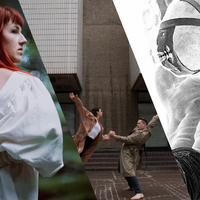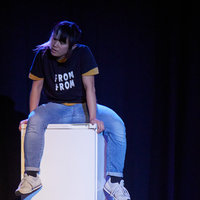Fri 19 Jan: Araminta Wraith, Hattie Musgrove and Sylvie Holder

News Story
Araminta Wraith We’ve had such a lovely time
Hattie MusgroveAria
Sylvie HolderSweet England
Live cello music and dance create a beautiful artistic dialogue in Hattie Musgrove’s Aria. Accompanied by the charismatic cellist Verity Lawrence, Musgrove’s body goes from sudden, tribal-like movements, with her hands seemingly channeling primal energies, to more fluid, wide moves. The music dictates the movement and vice-versa, creating a steady crescendo up until technology kicks in. The sudden intrusion of the digital silences the music and morphs the dancer’s body into a nearly robotic one. In an effort to preserve their human selves, both artists rediscover the joy of being in each other’s presence. For me, Aria definitely works best as a reminder of just how powerful the bond between a performer and a live musician can be on stage.
We’ve had such a lovely time, choreographed by Araminta Wraith and performed together with Nancy Kettle, combines movement and theatrical dialogue in a performance that relies on the sheer force of personal storytelling. Two dancers, one retired early because of a hip accident (Mia) and one at the top of her ballet career (Annie), struggle to find balance in their intertwined personal and professional lives. Visually, the most powerful scene shows Mia in their new house, more prison than home in the absence of her lover, contorting her body and then completely freeing herself in a moment of newly found relief. Drawing inspiration from Wraith’s personal life, theirs is a relationship that slowly eats itself alive. Even though certain tense moments feel a bit flat acting-wise and could use more of the 'show, don’t tell rule', her endeavours at mirroring her complicated relationship with dance, through this moving queer love story, is truly remarkable.
What Sylvie Holder does in Sweet England is choreographically explore a series of vignettes depicting day-to-day life of peasants in Western Europe during the Middle Ages. In doing so, she frees her characters of their names, biographies and identities, stripping their existence down to the basics – their cyclical work in the fields, rough sleeping and occasional love stories. Relying more on the power of aesthetics than on a structured narrative, she unravels history through the stories of the people it so often forgets. Holder’s performance turns out to be a bold attempt at redefining cultural archeology through dance, which leaves you wanting to dive deeper into the personal histories of these nameless protagonists.
Daria Ancuța
Aria by Hattie Musgrove aims to discuss the relationship between dance and music. In practical terms we had a dancer and musician on stage, but often the relational aspect was lacking. Moments communicate connection in literal and playful ways, but Musgrove also performs extended dance sections to recorded, percussive digital music as the cellist Verity Lawrence looks on. None of this is painful as Musgrove is a very capable dancer. Her movement style is powerful and precise, and lends well to the choreographic language which suggests Locking and Kathak influences. In its existing form the piece needs some editing and another look at the base intention, and how it's best realised.
Good dance theatre tends to come from a genuine place, and that's absolutely the case with We’ve Had Such a Lovely Time by Araminta Wraith. The work is autobiographical addressing Wraith's relationship with dance; previously and presently. The last few minutes are the most powerful, which see Wraith talking
directly to the audience, explaining the part-fiction/part-reality nature of the work we'd just seen; the breakdown of a human relationship and the complex dialogue between an artist and their art. In lots of ways the piece is at the beginning of its journey, and needs to keep developing how, and when to use language in relation to movement, so they become less disparate and more organic. Likewise with the live music aspect - another cellist (Olivier Van Den Hende) - which currently feels very muzak.
The blurb for Sweet England by Sylvie Holder confirms her interest in cinema, and that's absolutely where the piece takes one. Holder creates environment very well, from the stage strewn with hay-like material to softly lit tableau and vignettes suggesting community and occupation. The overall experience leans towards movement direction rather than choreography; like a play with sparse text or an art-house film more concerned with emoting than telling an actual story. I think Holder can afford to challenge her practice a little more. Minimalism is of course powerful, but total works also benefit from balance and perspective. A cheese sandwich is better with pickle; for some.
Matthew Paluch


